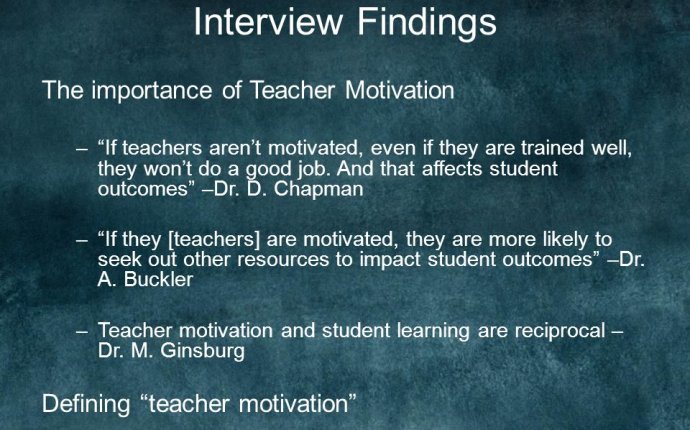
Importance of teacher motivation
The study addressed the issue of teacher motivation as an essential factor for classroom effectiveness and school improvement. Teacher motivation has to do with teachers' desire to participate in the education process.
772 (10%) public primary and secondary school teachers selected through strategic random sampling technique from the south eastern part of the country participated in the study.
Data was collected using a survey instrument designed by the researcher. Analysis of data revealed that the participating teachers almost unanimously agreed that teacher motivation is a vital factor for classroom effectiveness and school improvement.
It was therefore recommended that in this era of materialism and display of wealth in the face of widespread poverty teachers need to be adequately motivated (salaries must be paid as at when due and teaching facilities made available) for an effective viable school system.
Introduction
Motivation is not completely a new term. What is interesting about it is that it is commonly assumed to be a good thing that goes in influencing individual's behaviour and performance at work.
Teacher motivation naturally has to do with teachers' attitude to work. It has to do with teachers desire to participate in the pedagogical processes within the school environment. It has to do with teachers' interest in student discipline and control particularly in the classroom. Therefore it could underlie their involvement or non-involvement in academic and non-academic activities, which operate in schools. The teacher, is the one that translates educational philosophy and objective into knowledge and skill and transfers them to students in the classroom. Classroom climate is important in teacher motivation. If a teacher experiences the classroom as a safe, healthy, happy place with supportive resources and facilities for teaching for optimal learning, he/she tends to participate more than expected in the process of management, administration, and the overall improvement of the school. The teacher commands and emits the image of one who improves knowledge and the physical conditions of the classroom through orderliness, discipline and control. He makes diagnosis of student's feelings and attitudes inferred by their behaviour and response in the classroom environment. Hence Lash and Kirkpatrick (1990) concluded that in the absence of school programmes the major responsibility of working with children in the school rests with the teacher. Likewise, Maehr and Midgley (1991) affirm that what takes place in the classroom, even though the classroom itself is not an island, is critical. Therefore, depending on the degree of congruence with classroom practices and school environment, teachers teaching activities may dilute or enhance students' performance.
Effectiveness is the "what of change" while improvement is the "how of change" (Stoll and Fink 1996). Teacher motivation, therefore, is anything done to make teachers happy, satisfied, dedicated and committed in such a way that they bring out their best in their places of work so that both students, parents and the society will greatly benefit from their services.
Teachers have both intrinsic and extrinsic needs. A teacher who is intrinsically motivated may be observed to undertake a task for its own sake, for the satisfaction it provides or for the feeling of accomplishment and self-actualization. On the other hand, an extrinsically motivated teacher may perform the activity/duty in order to obtain some reward such as salary. Extrinsic motivation plays an important part in people's life. It is pre-eminent in influencing a person's behaviour. Therefore, the aim of the organization should be to build on and enhance the intrinsic motivation for teachers to teach effectively and at the same time, to supply some extrinsic motivation along the way for school improvement(O'neil, 1995).
Review of Literature
Educators are aware that reformers of education may establish new schools, effect changes in structure and curriculum, recommend and prescribe teaching methods and aids, in the end, the teacher will be solely responsible for applying them. …









